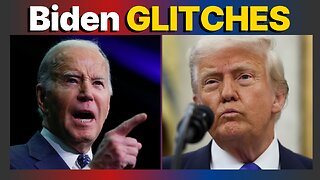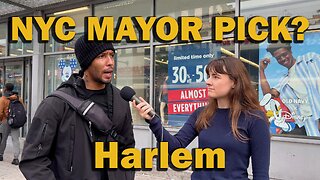Premium Only Content

Nigel Farage vs the Cotswolds - Who Wins? - Reform Election 2024
Nigel Farage, a prominent figure in British politics, has recently announced his decision to stand as a candidate for the Reform UK party. This move marks another chapter in the career of a man who has been a central figure in the United Kingdom's political landscape for decades.
Born on April 3, 1964, in Farnborough, Kent, Farage's early life was characterized by a stint at Dulwich College, followed by a career as a commodities trader in the City of London. His entry into politics came with the formation of the United Kingdom Independence Party (UKIP) in 1993. Farage joined UKIP shortly after its inception, driven by a strong Eurosceptic stance and the belief that Britain's sovereignty was being eroded by its membership in the European Union.
Farage's charisma and relentless campaigning saw him rise through the ranks of UKIP, becoming its leader in 2006. His leadership was marked by a single-minded focus on Brexit, which gradually brought UKIP from the fringes to the forefront of British politics. Farage's ability to connect with disillusioned voters, combined with his skillful use of media, helped UKIP secure significant victories, including the 2014 European Parliament elections where it emerged as the largest British party.
The pinnacle of Farage's career came with the 2016 Brexit referendum. As one of the most vocal and visible proponents of leaving the EU, his role was instrumental in the success of the Leave campaign. The referendum's result was a vindication of his decades-long crusade against EU membership. However, following the referendum, Farage stepped down as UKIP leader, declaring his political goal achieved.
Despite stepping back, Farage remained a potent force in British politics. Disillusioned by the handling of Brexit by subsequent governments, he returned to frontline politics in 2019 by founding the Brexit Party, which later rebranded as Reform UK. The party's primary aim was to ensure the completion of Brexit and advocate for broader political reforms in the UK.
Farage's recent decision to stand as a candidate for Reform UK signals his continued commitment to reshaping British politics. His decision is driven by a belief that the UK's political system requires fundamental changes beyond Brexit. He argues that issues such as electoral reform, government accountability, and a more direct democracy need to be addressed to restore public trust in the political process.
Reform UK, under Farage's leadership, is expected to push for policies that promote these changes. Farage's presence in the party brings significant media attention and a strong base of supporters who are dissatisfied with the traditional political parties. His candidacy aims to capitalize on this support and challenge the status quo in British politics.
Nigel Farage's journey from a commodities trader to a pivotal figure in British politics is a testament to his persistence and ability to tap into public sentiment. His latest venture with Reform UK underscores his belief that his work is far from over and that the political landscape in the UK still requires significant transformation. As he steps back into the electoral fray, all eyes will be on whether he can once again galvanize support and bring about the changes he passionately advocates for.
Migrants and illegal immigrants have long been a contentious issue in the UK, sparking debates on economic, social, and political fronts. Migrants, including both legal and illegal immigrants, contribute significantly to the UK's economy, filling crucial roles in sectors like healthcare, construction, and hospitality. However, the influx has also raised concerns over job competition, strain on public services, and cultural integration.
Nigel Farage, former leader of the UK Independence Party (UKIP) and prominent Brexit campaigner, has been a vocal critic of high immigration levels and illegal immigration. Farage argues that uncontrolled immigration undermines British sovereignty and public safety. He contends that the EU's freedom of movement policy, which allows citizens of member states to live and work in other member countries, has led to an unsustainable number of migrants entering the UK.
Farage has consistently pushed for stricter immigration controls, advocating for a points-based system to ensure that only skilled migrants who can contribute positively to the economy are allowed entry. He believes that Brexit was a crucial step in regaining control over the UK's borders. His stance resonates with many who feel that the government has failed to manage immigration effectively, but it also draws criticism for fostering division and xenophobia.
Farage's position reflects a broader skepticism towards globalization and supranational governance, emphasizing national sovereignty and self-determination. While his rhetoric has influenced immigration policy discourse.
-
 LIVE
LIVE
LFA TV
12 hours agoLFA TV ALL DAY STREAM - FRIDAY 8/1/25
11,882 watching -
 LIVE
LIVE
JuicyJohns
8 minutes ago🟢#1 REBIRTH PLAYER 10.2+ KD🟢$500 GIVEAWAY SATURDAY!
81 watching -
 LIVE
LIVE
The Bubba Army
22 hours agoHulk Hogan had Leukemia? - Bubba the Love Sponge® Show | 8/01/25
3,267 watching -
 18:36
18:36
DeVory Darkins
8 hours ago $1.56 earnedTrump scores MAJOR WIN with Americas youth as Biden drops HORRIBLE speech
2.49K19 -
 14:13
14:13
Clickbait Wasteland
13 hours ago $2.22 earnedAsking New Yorkers Who they Support for Mayor: Harlem
29.9K26 -
 19:55
19:55
The Rad Factory
15 hours ago $0.48 earnedCan I Fix My Fire Damaged F1 Car?
3.71K1 -
 1:26:22
1:26:22
Dialogue works
2 days ago $0.20 earnedScott Ritter: Russia Just DEFIED the U.S.: We'll End the War on OUR Terms!
3.35K7 -
 LIVE
LIVE
BEK TV
23 hours agoTrent Loos in the Morning - 8/01/2025
285 watching -
 13:08
13:08
Dad Saves America
13 hours ago $0.86 earnedTeachers Unions Play Politics While Students Lag Behind - Poisoning of the American Mind: Pt 4
11.4K11 -
 20:05
20:05
Preston Stewart
13 hours ago $1.59 earnedCrimea Raid to Chasiv Yar Fight
10.9K8